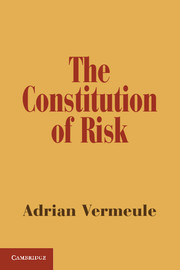Book contents
- Frontmatter
- Contents
- Epigraph
- Introduction
- Part I Theory
- Part II Applications
- 3 The Framers’ Self-Defeating Precautions
- 4 The Risks of Impartiality: On Judging in One’s Own Cause
- 5 The Risks of Deliberation: Second Opinions
- 6 The Risks of Expertise: Political Administration and Expert Groupthink
- Conclusion Constitutional Rulemaking Without a Style
- Acknowledgments
- Index
- References
5 - The Risks of Deliberation: Second Opinions
Published online by Cambridge University Press: 05 June 2014
- Frontmatter
- Contents
- Epigraph
- Introduction
- Part I Theory
- Part II Applications
- 3 The Framers’ Self-Defeating Precautions
- 4 The Risks of Impartiality: On Judging in One’s Own Cause
- 5 The Risks of Deliberation: Second Opinions
- 6 The Risks of Expertise: Political Administration and Expert Groupthink
- Conclusion Constitutional Rulemaking Without a Style
- Acknowledgments
- Index
- References
Summary
A standing anxiety of constitutional rulemaking, especially in the liberal tradition, is that lawmakers within the constitutional system will make hasty or ill-considered decisions under the influence of passion or prejudice. Accordingly, constitutional rulemakers often institute precautions against such decisions; second-opinion mechanisms are a leading example of such precautions. Many institutional structures, rules, and practices have been justified as mechanisms for requiring or permitting decision makers to obtain second opinions. Examples include judicial review of statutes or of agency action, bicameralism, the separation of powers, and certain elements of the law of legislative procedure. These deliberative procedural mechanisms have many attractions, especially from the standpoint of liberal theorists: they are in some sense value-neutral, and thus promise to improve the quality of decision making without dictating substantive outcomes a priori.
Yet additional layers of deliberation and procedure are never costless or risk-free, and second opinions are hardly costless either. Such mechanisms increase the direct costs and opportunity costs of the lawmaking system and, under certain conditions, can actually have perverse results, encouraging rather than suppressing ill-considered decisions. In this chapter, I will attempt a mature consideration of both sides of the ledger. I will thus illustrate both the conditions under which second-opinion mechanisms increase the expected quality of decisions and the overall utility of the constitutional system, and also the conditions under which such mechanisms create countervailing risks or perverse effects, and thus create costs in excess of their benefits.
- Type
- Chapter
- Information
- The Constitution of Risk , pp. 141 - 162Publisher: Cambridge University PressPrint publication year: 2013

